Energy Transition Conference 2018
Energy Transition Conference 2018

27 February at Clarion Hotel & Congress in Trondheim
- Mid-century strategies: Are we on track towards the 2-degree target?
- The need for flexible energy - The role of natural gas
- Funding the transition - Financial risk and strategic planning
- Radical innovation in the energy sector
Previous conferences
- Energy Transition Conference 2025
- Energy Transition Conference 2024
- Energy Transition Conference 2023
- Energy Transition Conference 2022
- Energy Transition Conference 2021
- Energy Transition Conference 2020
- Energy Transition Conference 2019
- Energy Transition Conference 2018
- Energy Transition Conference 2017
Conference 2018
Keynote presentations
Keynote presentations
- Aidan Cronin: The Energy Transition - An attemt at framing
- Ellen Williams: Moving Innovation from Invention to Investment
- Johannes Trüby - Part 1: World Energy Outlook 2017
- Johannes Trüby - Part 2: World Energy Outlook 2017
- Francesco Cherubini: Transitions in the transport sector
- Gunnar Luderer: Deep decarbonization for 1.5-2 degree climate stabilisation
- Idar Kreutzer: Funding the transition
- Irene Rummelhoff: The role of industry in the energy transition
- Jae Edmonds: Scenarios for Financial Disclosure
- Knut H. H. Johansen: How Technology Convergence is Impacting Radical Innovation in the Energy Sector
- Liv Hovem: Energy Transition Outlook 2050
- Michael Hayne: Monotoring Financial Markets
- Robert Ritz: Global Gas Markets and the Future of Natural Gas
- Sonja Chirico Indrebø: Funding the Transition - Financial Risk and Strategic Planning
- Trude Sundset: Why Invest in CCS?
Programme
Programme
Watch the keynotes and discussions on YouTube
08:30 Registration
09:00 Welcome
Johan Hustad, Director NTNU Energy and Asgeir Tomasgard, Director NTNU Energy Transition
09:10 Mid-century strategies for climate and energy
09:10 World Energy Outlook 2017
- Johannes Trüby, International Energy Agency
-
Discussion with expert group
10:00 Deep decarbonization scenarios for 1.5-2°C climate stabilization
-
Gunnar Luderer, Senior Researcher, PIK
10:20 Transition of the energy sector
- Liv Hovem, CEO Oil & Gas, DNV GL
10:40 The role of industry in the transition
- Irene Rummelhoff, EVP New Energy Solutions, Statoil
11:00 Transitions in the transport sector
- Francesco Cherubini, Professor, NTNU
11:40 Panel discussion: Are we on track for the 2 degree target
- Irene Rummelhoff, EVP New Energy Solutions Statoil
- Volker Krey, Deputy Program Director, IIASA.
- Gunnar Luderer, Senior Researcher, PIC
- Francesco Cherubini, Professor, NTNU
- Liv Hovem, CEO, DNV GL Oil & Gas,
Discussion with expert group
13:30-15:00 Funding the transition - financial risk and strategic planning
13:30 Scenarios for Financial Disclosure
- Jae Edmonds, Chief scientist, Joint Global Change Research Institute
13:45 Monitoring Financial Markets
- Michael Hayne, Senior Analyst, 2 degrees investing initiative
14:00 Funding the Transition
- Idar Kreutzer, CEO Finans Norge
14:05 Funding the transition - financial risk and strategic planning
- Sonja Chirico Indrebø, Vice-President for Strategy and Innovation, New Energies Solutions, Statoil
14:10 Panel
- Michael Hayne, Senior Analyst, 2 degrees investing initiative
- Ståle Gjersvold, CEO, Trønderenergi
- Sonja Chirico Indrebø, Vice-President for Strategy and Innovation, New Energies Solutions, Statoil
- Jae Edmonds, Chief scientist, Joint Global Change Research Institute
- Thina Saltvedt, Chief Analyst, Nordea
- Idar Kreutzer, CEO Finans Norge.
Discussion with expert group
15:30-17:00 Flexible and clean energy for the future - does natural gas play a role?
15:30 Why invest in CCS?
- Trude Sundset, CEO Gassnova.
15:50 Global gas markets and the future of gas
- Robert Ritz, Assistant Director of the Energy Policy Research Group, University of Cambridge
16:05 The role of gas in Europe’s energy transition
- Johannes Trüby, Senior Energy Analyst, IEA
16:25 Panel (Moderator: Johan Hustad, Director NTNU Energy)
- Trude Sundset, CEO, Gassnova.
- Robert Ritz, Assistant Director of the Energy Policy Research Group, University of Cambridge
- Sergey Paltsev, Deputy Director of the MIT Joint Program on the Science and Policy of Global Change
- Jean André, International Expert, Air Liquide
- Johannes Trüby, Senior Energy Analyst, IEA
Discussion with expert group
17:15- 19.00 Radical innovation in the energy sector
17:15 Sustainable transition competition: Sustainability pitch and voting
- Apico, 90 sec. pitch and questions
- Apolonia Agrotech, 90 sec. pitch and questions
- Hark Technologies, 90 sec. pitch and questions
- NårgeSol, 90 sec. pitch and questions
- Sensero, 90 sec. pitch and questions
17:35 Moving Innovation from Invention to Investment
- Ellen Williams, Distinguished University Professor, University of Maryland
17:50 How Technology Convergence is Impacting Radical Innovation in the Energy Sector
- Knut H. H. Johansen, CEO, eSmart systems
18:05 Energy Transition - an attempt at framing
- Aidan Cronin, ETIP Wind Chair, Siemens Gamesa Renewable Energy
18:20 Panel
- Benjamin Sovacool, Professor of Energy Policy, Sussex University
- Ellen Williams, Distinguished University Professor, University of Maryland.
- Knut H.H. Johansen, CEO eSmart systems.
- Kristina Edström, Professor, Uppsala University
- Alexandra Bech Gjørv, CEO, SINTEF
- Aidan Cronin, ETIP Wind Chair, Siemens Gamesa Renewable Energy
Comments from audience
Sustainable transition competition: Price awarded by Tor Ulleberg, Statoil
19:00 Reception
Speakers and panel participants
Speakers and panel participants
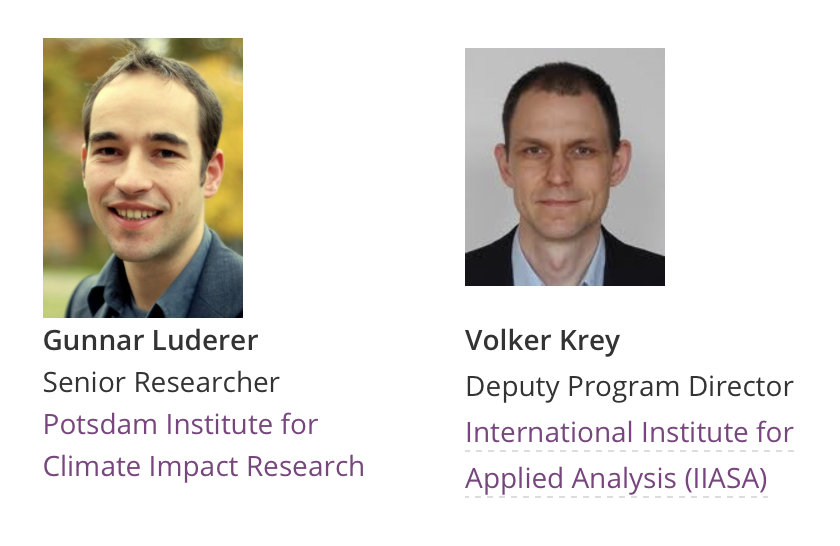
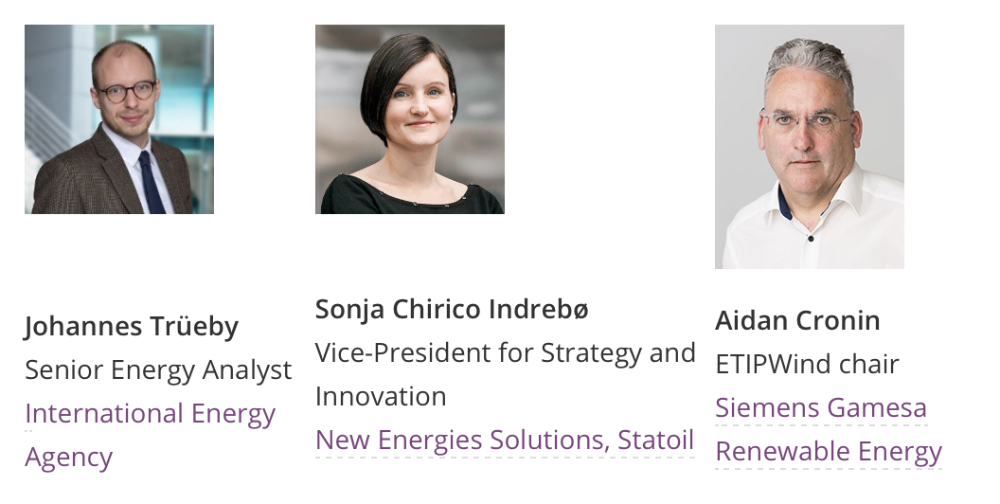
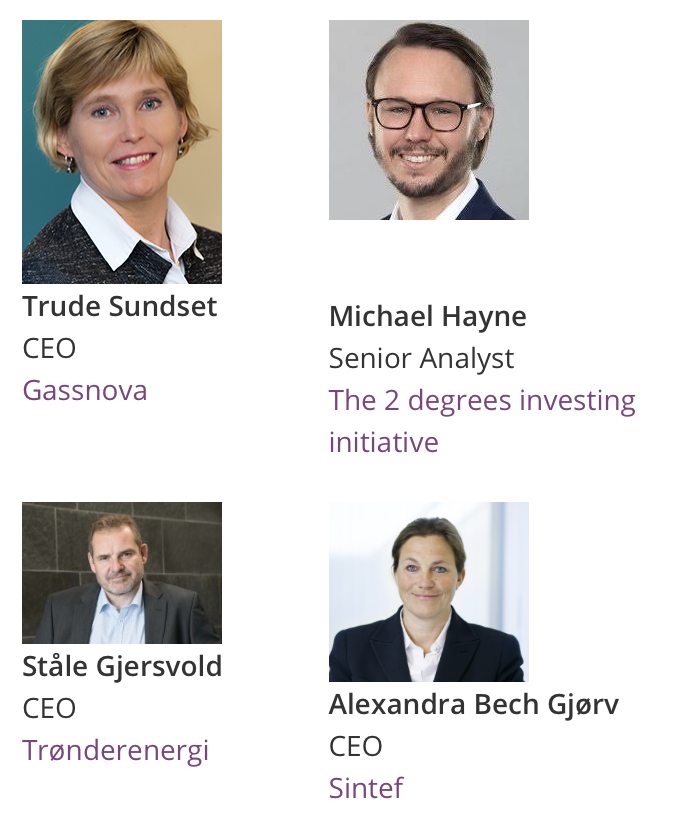
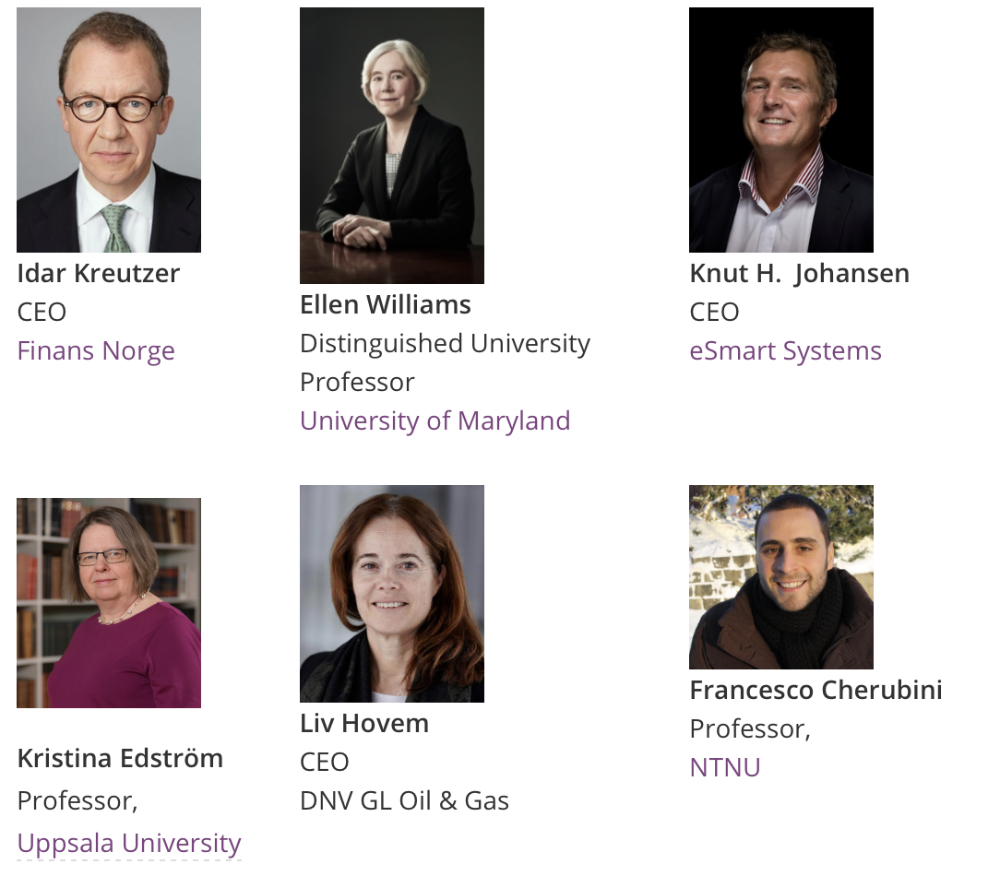
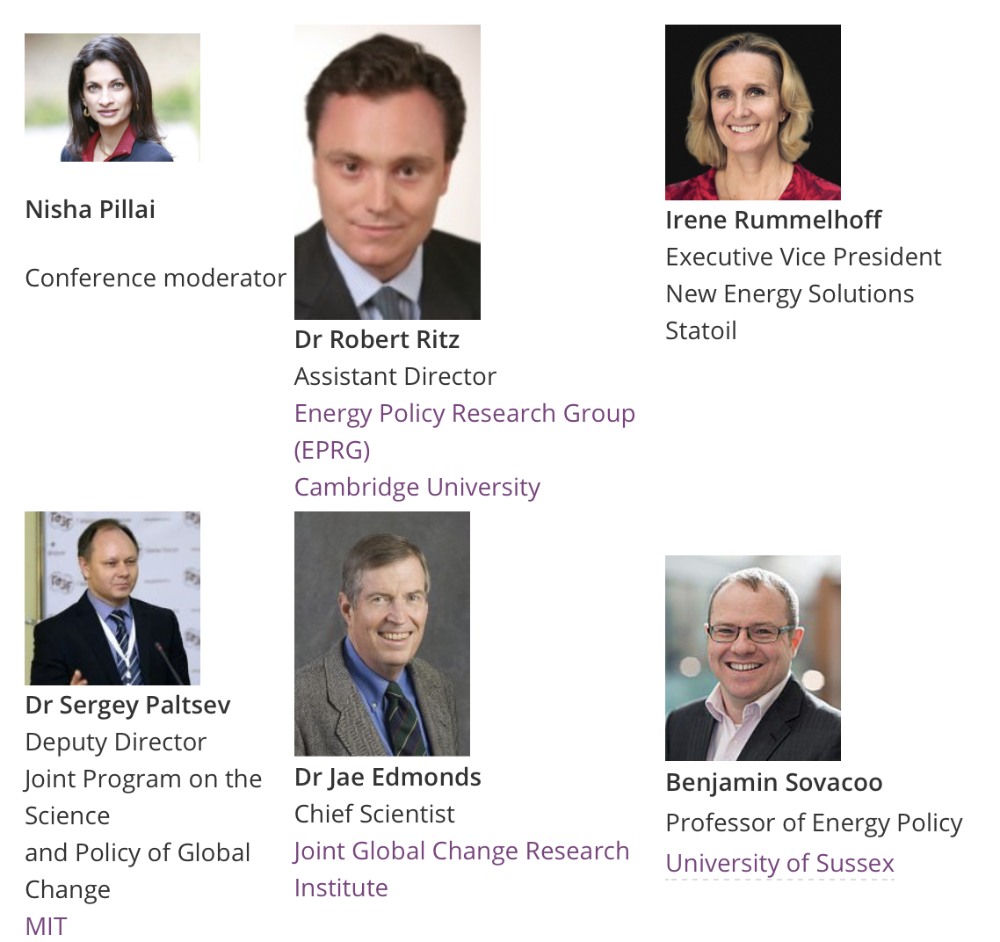
Programme committee
Programme committee
Videos
Videos
Welcome: Johan Hustad, Director NTNU Energy
World Energy Outlook 2017: Johannes Trüby, International Energy Agency
Deep decarbonization scenarios for 1.5-2°C climate stabilization: Gunnar Luderer, Senior Researcher, PIK
Transition of the energy sector: Liv Hovem, CEO Oil & Gas, DNV GL
The role of industry in the transition: Irene Rummelhoff, EVP New Energy Solutions, Statoil
Transitions in the transport sector: Francesco Cherubini, NTNU
Panel discussion: are we on track for the 2 degree target?
Scenarios for financial disclosure: James Edmonds, Joint Global Change Research Institute
Monitoring Financial Markets: Michael Hayne, Senior Analyst, 2 degrees investing initiative
Funding the Transition: Idar Kreutzer, CEO Finans Norge
Funding the transition - financial risk and strategic planning: Sonja Chirico Indrebø, Vice-President for Strategy and Innovation, New Energies Solutions, Statoil
Panel discussion: funding the transition - financial risk and strategic planning
Why invest in CCS? Trude Sundset, CEO, Gassnova
Global gas markets and the future of gas: Robert Ritz, Assistant Director of the Energy Policy Research Group, University of Cambridge
The role of gas in Europe’s energy transition: Johannes Trüby, Senior Energy Analyst, IEA
Panel discussion: Flexible and clean energy for the future - does natural gas play a role?
Pitch, Apico
Pitch, Apolonia Agrotech
Pitch, Hark Technologies
Pitch, NårgeSol
Pitch, Sensero
Moving Innovation from Invention to Investment: Ellen Williams, Distinguished University Professor, University of Maryland
How Technology Convergence is Impacting Radical Innovation in the Energy Sector : Knut Johansen, CEO, eSmart systems
Energy Transition - an attempt at framing: Aidan Cronin, ETIP Wind Chair, Siemens Gamesa Renewable Energy
Panel discussion: Radical innovation in the energy sector
Workshops 2018
The role of natural gas
The role of natural gas
About
26 February:
This workshop brings together academics and industry to define a research agenda on the future of natural gas.
We would like to involve partners to identify research questions that can lay the fundament for a multi-national project on the role of natural gas in the future energy system.
The workshop will be a mix of 10-15 minutes long keynotes, prepared introductions, and discussion. The outcome will be a draft for a natural gas research agenda. Some of the topics of interest are:
- Technological capabilities of natural gas as a flexibility option
- the use of line pack for storage services and demand for these,
- the flexibility characteristics of gas powered generators with/without CCS
- The role of hydrogen and CCS in natural gas value chains.
- New services and market design for flexibility provision in the gas sector.
- What role will natural gas have in the 1.5 and 2 degree scenarios – in Europe and globally
The workshop will be used to introduce and develop further topics that are critical for the future of natural gas.
This meeting employs a modified Chatham House Rule. Participants are free to use the information received during the meeting, but specific positions taken by individuals should not be attributed without expressed permission. However, formal presentations, the meeting agenda and the meeting participation list will become part of the public meeting record unless participants request anonymity.
Agenda
The workshop agenda is designed to encourage discussion among the participants. We have incorporated a number of different roles for participants, but first and foremost, we view all participants as equal contributors for each session. The workshop will include 2-3 introductions (10-15 minutes long) for each session, some prepared initial comments (3-4 minutes without slides), and the most important part; plenary discussion. A chair will help focus on what we can do to inform the process.
8:30 Bus Transport from Hotel to Statoil
9:00 Session 1 Welcome, Context and Objectives for workshop
Chair: Asgeir Tomasgard (NTNU) / Per Ivar Karstad (Statoil)
Welcome (10 min) Johan Hustad, NTNU / Henriette Undrum, Statoil
The Role of Natural Gas in the Future Energy System – possibilities and challenges, Asgeir Tomasgard, NTNU (15 minutes)
The role of natural gas in climate gas mitigation, Jae Edmonds, Chief Scientist, Joint Global Change Research Institute (15 minutes)
Discussion (25 min)
10:10 Session 2: Technological capabilities – What new development is needed for natural gas to play a role in a sustainable energy system?
Chair: Henriette Undrum, Statoil
Introductions (45 min)
- The value chain perspective: Natural gas, hydrogen and CCS, Mona Mølnvik, Research Director, SINTEF
- Technological capabilities for power plants with CCS, Lars Nord, Associate Professor, NTNU
- Hydrogen value chain, Per Ivar Karstad, Statoil
Initial comments (15min; ~5 minutes each)
- The US Hydrogen perspective, Katrina Groth, Assistant Professor, University of Maryland
- The Norwegian perspective on CCS, Ståle Aakenes, Gassnova.
- The European perspective, Oliver Massol, IFP
Open Discussion (30 minutes)
11:40 Lunch - 1 hour
12:40 Session 3: Global gas markets and climate mitigation
Introduction
Chair: Magnus Korpås, NTNU
Introductions (30 min)
- The global role of natural gas in a climate strategy perspective, Sergey Paltsev, Deputy Director, MIT
- Shale gas and LNG - effects on global markets, Steven Gabriel, University of Maryland
- Global natural gas markets - perspectives from the World Energy Outlook, Johannes Trueby, Senior Energy Analyst, IEA
Initial comments (15 min ~5 minutes each)
- Christian von Hirschhausen, DIW Berlin
- Impact of an Ice-Free Northeastan Passage, Reinhard Madlener, RWTH Aachen
- Europe and the future of Norwegian natural gas, Morten Anker, Deputy Director General, Ministry og Petrolium and Energy
Open Discussion (40 minutes)
14:10 Break
14:40 Session 4: Policy and acceptance, new services and regulation: What new development is needed for natural gas to play a role. (90 min)
Chair: Volker krey, IIASA
Introductions (20 minutes)
- The role of natural gas in the Energiwende, Franizika Holz, DIW Berlin
- Flexibility from natural gas pipelines, Kjetil Midthun, Senior Research Scientist, SINTEF
Initial comments (20 min)
- Homeowner satisfaction with low-carbon heating technologies, Richard Mndlener, RWTH Aachen
- Perspective from the gas transport industry, Daniel Muthmann, Head of Corporate Development, Open Grid Europe
- The economies of shared CCS infrastructure, Oliver Massol, IFP
Open Discussion (35 minutes)
16:00 Break
16:30 Session 5: Research Needs and Future Directions
Chair: Asgeir Tomasgard
What Research Needs Have We Identified? (30 minutes)
- Observation— Capabilities and technology research needs, TBA, industry
- Observation—Policy, regulation and new services needs—Robert Ritz, Assistant Director,University of Cambridge
- Observatio— Global gas markets and mitigation needs—Christian von Hirschhausen, TU Berlin
Reflections (45 minutes)
Discussion of key findings from workshop and the most important research questions going forward. Each participant gets up to 1 minutes for remarks.
Future Directions (10 minutes)
Follow up Asgeir Tomasgard
17:40 Adjourn
18:00 Bus to hotel
19:00 Dinner
The role of natural gas
The role of natural gas
26 February:
A set of presentations
- Aad Correljé - The changeing role of the Netherlands in European gas supply
- Asgeir Tomasgard - The role of natural gas in the future energy system - possibilities and challenges
- Christian von Hirschhausen - Research Outlook
- Franziska Holz - The role of natural gasin the Energiwende
- Jae Edmonds - The role of natural gas in climate mitigation
- Johannes Trüby - Global natural gas markets
- Katrina Groth - Presentation
- Kjetil Midthun - Flexibility from natural gas pipelines
- Lars Nord - Technological capabilities for power plants with CCS
- Mona Mølnvik - The value chain perspective
- Olivier Massol - The economics of shared CCS infrastructure
- Reinhard Madlener - Homeowner satisfaction with low-carbon heating technologies
- Reinhard Madlener - Impacts of an ice-free northeast passage
- Robert Ritz - The role of natural gas policy & regulation
- Sergey Paltsev - The global role of natural gas in a climate strategy perspective
- Steven Gabriel - Shale gas and LNG - effects on global markets
Radical innovation
Radical innovation
About
1 March
In this workshop, we will focus on the need for radical innovation with a particular focus on climate mitigation and the energy sector. We will have 4 sessions. Each session will consist of 2-3 introductions (10-15 minutes long), some prepared initial comments (3-4 minutes without slides), and the most important part; an open, plenary discussion. A chair will help focus on what we can do to inform the process.
The purpose will be to identify central research challenges and to give input to policy makers on research and innovation strategies. Some questions of interest are:
- What is needed in the energy sector to keep it an engine for economic growth but approaching zero emissions?
- How will that be driven by change in markets and business models?
- What affects the decisions of individuals and institutions?
- The role of innovation and learning in mitigation and adaptation
- How can we best facilitate radical innovation form research and how should that affect the way we design the innovation system?
Agenda
08:30 Bus Transport from Hotel
09:00 Welcome, Context and challenges for workshop
Welcome
Asgeir Tomasgard, NTNU & Tor Ulleberg, Statoil (5 min)
Background and objectives
Roger Sørheim, NTNU (5 min)
Research institutions as drivers of radical innovation?
Ellen Williams, Professor, University of Maryland (20 min)
Discussion 20 min
09:50 The roles of radical innovation and their interaction: Community, firm level and individual views
Chair: Jae Edmonds, Chief scientist, JGCRI
Introductions (15 min each)
- Accelerating future energy transitions, Benjamin Sovacool, Professor, University of Sussex
- How can the emergence of new technologies contribute to larger societal transformation? Jochen Markard, Professor, ETH
- Individual behaviour and implementations of radical innovation, Erica Löfström, NTNU
- From student idea to implementation - the story of Connect LNG, Miriam Emilie Wennberg, CFO Connect LNG
Short comments (5 minutes each):
- Radical innovation – an industry perspective, Aidan Cronin, ETIP Chair/ Siemens
- The perspective of an energy company, Daniel Muthman, Head of Corporate Development, Open Grid Europe.
Discussion (30 minutes)
11:30 Lunch
12.30 Challenge-based work session "The Ducky experience"
The world faces huge challenges and we need radical innovations to solve them. Such innovations will disrupt existing business models and ways of thinking, and special structures are therefore needed to lead such innovations.
In this workshop you will be challenged to rethink how organizations and teams can be optimized. During a couple of hours we will form teams and explore how you best can collaborate in order to achieve radical innovations.
In this practical part of the workshop where participants are divided into teams, working on several of the challenges presented during the day. Each group will be facilitated by a chosen participant, enabling different perspectives and background being represented. The groups are given the opportunity to present the outcome at the end of the day.
16.20 Break
16.30 Co-creation of a research agenda
Presentation of team results
Each group will have three minutes to briefly present the results from the team session.
17.30 Closing remarks
Asgeir Tomasgaard
Tapas directly after the workshop
19.00 Bus to hotel
Radical innovation
Radical innovation
1 March
A set of presentations
- Benjamin Sovacool - Accelerating future energy transitions
- Ellen Williams - Growing Radical Innovation from Basic Research Insights
- Erica Löfström - Individual behaviour and implementations of radical innovation
- Jochen Markard - Energy Transition 2.0A sustainability transitions perspective
- Miriam Wennberg - From Student Idea to Implementation: The Connect LNG Story
The future transport system
The future transport system
About
2 March
This workshop addresses the role of the transport system in reducing GHG emissions and explores pathways towards zero emission transport systems. We will have 4 sessions. Each session will consist of 2-3 introductions (10-15 minutes long), some prepared initial comments (3-4 minutes without slides), and the most important part; an open, plenary discussion. A chair will help focus on what we can do to inform the process.
The purpose is to identify central research challenges and to shape a number of new research projects. Some questions of interest to drive the discussion are:
- What would be the effects of the transition if other countries would follow Norways example on transport sector policy, both in terms of GHG reductions, welfare and development of global commodity markets
- What would be the most efficient ways for the rest of the world to implement policies towards the 2-degree target, and in particular what role would the transport sector play in different pathways
- What is the role of batteries, hydrogen, biofuels in the transition. Are they competitors or do they complement each other.
- Deep interventions for a low-carbon future: going beyond technological solutions
- The future of the car, shared mobility, practice changes and the role of users in the transition to future transport systems
- The mobility transition in China
Agenda
08:00 Bus from Clarion Hotel Brattøra to NTNU
08:30 Session 1: Climate Change Mitigation in the Transport Sector – The big picture
Chair: Anders Hammer Strømman - NTNU
Welcome (5 min)
- Round around the table (10 min)
- Setting the stage: Anders Hammer Strømman – NTNU (5 min)
Introductions (45 min)
- Transport and Mitigation over the past decades – Jae Edmonds (10 min)
- Technology choice and climate mitigation effects, Andreas Schäfer, UCL, (10min)
- Global Mobility Scenarios, Sonia Yeh, (10 min)
- The relevance of Short Lived Climate Forces on Mitigation in the Transport Sector, Helene Muri, NTNU (5 min)
- The land nexus: Climate, Biofuels, Food and Biodiversity, Francesco Cherubini, NTNU (5 min)
Initial comments (10min; ~5 minutes each)
- Rosetta Steeneveldt, Statoil
- Onus Özgün, DNV GL
Discussion (40 min)
10.30 Break
10:40 Session 2: Key Technologies - Status and Prospects (60 min)
This session focuses on the impact that technology choice will have on sustainable transition and on climate mitigation. Hydrogen, battery electric vehicles and biofuels have different technological characteristics and different emission footprints. Technology choices also has other sustainability impacts beyond emissions. Here we focus mainly on the role different technologies can play in the transition and other effects like the land nexus addressing effects on climate, biofuels, food and biodiversity.
We also address the role of maritime transportation and aviation. The central question is what roles technologies will play in different scenarios and what policy would be needed to support transition. Wil there be a mix of technologies playing together, and if so how should that affect transition strategies and policy measures
Chair: Fride Vullum-Bruer, NTNU
Introductions (10 minutes each)
- Hydrogen, Øystein Ulleberg (10 min)
- Batteri, Brent Perry (10 min)
- Tom Nørbech, Statens vegvesen (10 min)
Initial comment (5 min)
- Research for TRAN Committee - Lifecycle GHG emissions of battery-powered electric vehicles, Linda Ager-Wick Ellingsen, NTNU
Open Discussion (30 min)
11:40 Lunch
12:40 Session 3: Mobility transitions: Practice change, the role of users and innovations in urban transport
Deep interventions for a low-carbon future requires going beyond technological solutions. This session focuses on radical changes and low carbon transition by looking at the overlapping roles of technological innovation, practice change and policy frameworks in the transport sector. Sharing, electrification and autonomous driving are set to reshape the way people and goods move over the coming decades, raising issues such as the future of the car and implications for the world’s commodity markets providing fuel for cars. But, none of the outcomes are guaranteed, and nor is the speed of progress.
In this session we aim to conceptualize further how to accelerate the low carbon mobility transition and analyze different actors and processes that will have to be aligned in order for it to happen. We highlighting the place-specific, geopolitical and cultural sensitivities of low carbon transitions at national, regional and local scales. Thus, relevant questions are, but not limited to:
- What is the role of users in the energy and mobility transition? Who will benefit from innovation in urban transport?
- What is the role of transnationally complex knowledge and finance flows? What are the reasons for geographic variation in disruption processes currently underway? The role of China in fostering low carbon change in the transport sector?
- How can governments, industry and researchers collaborate to develop competitive opportunities and foster innovations and change? What is the role of incumbents in such a system transformation?
- What measures needs to be taken to speed up the transition and how can we imagine the futures of sustainable transport to evolve?
Chair: Marianne Ryghaug, NTNU
Introductions
- Beyond technology: Deep interventions for a low-carbon future, Debbie Hopskins, Oxford University
- The role of users in a transition perspective, Laur Kanger, Sussex University
- Urban mobility transitions in China (Via Skype), David Tyfield, Lancaster University
Initial comments (15 min, ~5 min each)
- Andreas Enge, ATB
- Erik Figenbaum, TØI
Open Discussion (40 min)
14:10 Break
14:40 Session 4: Research Needs and Future Directions
This asks the question, what are the most urgent research needs to ensure that transport will play a role climate mitigation, focusing both on technological needs, policy and regulation as well as the role of the consumer.
Chair: Asgeir Tomasgard
What Research Needs Have We Identified? (30 minutes)
- Intervention: Capabilities and technology research needs
- Intervention: Policy, regulation and new services needs
- Intervention: The role of the consumer
Intervention/observation
- Markus Steen, SINTEF Teknologi og samfunn
Reflections (45 min)
Discussion of key findings from workshop and the most important research questions going forward. Each participant gets up to 1 minutes for remarks.
Future Directions (10 min)
Chair: Asgeir Tomasgaard
The future transport system
The future transport system
2 March:
A set of presentations
- Andreas Shafer - Addressing the Climate Change Challenge in the Transportation Sector
- David Tyfield - Low Carbon Mobility in China: To the Rescue?
- Debbie Hopkins - Beyond technology? Deep interventions for a low-carbon future
- Erik Figenbaum - Perspectives on Norway’s supercharged electric vehicle policy
- Francesco Cherubini - The land nexus: Climate, Biofuels, Food and Biodiversity
- Helene Muri - The role of Short Lived Climate Forcers in mitigation in the transport sector
- James Edmonds - Electrification of Transport, Energy, Emissions, and Economy
- Lasse Fridstrøm - Policy, regulation and new services needs
- Laur Kanger - Socio-technical transitions and users
- Linda Ager-Wick Ellingsen - Lifecycle GHG emissions of battery-powered electric vehicles
- Sonia Yeh - Global Mobility Scenarios
- Tom Nørbech - Electric Infrastructure for Goods Transport
- Øystein Ulleberg - Hydrogen for Transport
